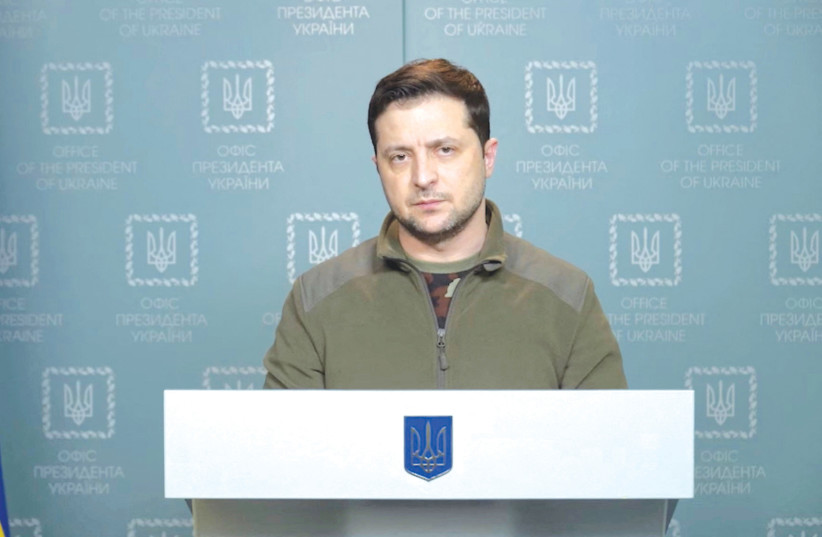The United Nations Human Rights Council voted 32-2 on Friday to open a Commission of Inquiry into Russian human rights abuses in Ukraine.
The three-person team will investigate “all alleged violations and abuses of human rights and violations of international humanitarian law, and related crimes, in the context of the Russian Federation’s aggression against Ukraine,” the resolution states.
In addition, the probe will “establish the facts, circumstances, and root causes of any such violations and abuses.”
Russia and Eritrea were the only countries to oppose establishing the commission. The UNHRC vote was among a number of actions international bodies have taken to condemn Moscow since its military invaded Ukraine on February 24.
Some rights groups had called for Russia, a voting member of the 47-member council, to be suspended. However, this can only be decided by the United Nations General Assembly in New York.

Ukrainian President Volodymyr Zelensky welcomed the creation of the probe, tweeting, “Evidence will be documented and used in international courts. Russian war criminals will be held accountable.”
I welcome the establishment by the #UN Human Rights Council of the International Commission of Inquiry to investigate facts of Russian war crimes against Ukraine. Evidence will be documented and used in international courts. Russian war criminals will be held accountable.
Flanked by Western ambassadors, Ukraine’s Ambassador to the United Nations in Geneva Yevheniia Filipenko reiterated to reporters after the vote, “Those from Russia directing and committing violations against my people should be paying attention. The evidence is going to be collected. You are going to be identified, and you are going to be held to account.”
Filipenko said the commission would work alongside the International Criminal Court in the Hague, which has sent a team to the Ukraine region to look into possible war crimes by all parties in the conflict, the ambassador said.
At the UNHRC, Filipenko thanked all those who had stood up for the right cause.
She told Russian and Belarusian representatives in Geneva that they had a choice between “defending evil or human dignity.”
Prior to the vote, US Ambassador to the UN in Geneva Sheba Crocker said that, “With millions of civilian lives at stake, Ukrainian and non-Ukrainian alike – as Russian troops open fire on the streets of Kyiv, as they drop bombs on residential buildings in populated areas, as they shell kindergarten students in their schools – Russia must be held to account by this council.
“The United States and the American people stand with Ukraine and its people,” she said.
The Polish envoy said that the invasion “confirmed our worst fears that Russia holds human rights in complete disregard.”
The Lithuanian envoy said what was happening in Ukraine was not a “conflict,” but a display of Russian aggression; “an attack against us all, against international law and rules, against the multilateral system that we believe in.”
Russia, which has called its actions since February 24 a “special military operation,” has denied targeting civilians in its besieged southwestern neighbor.
Russia’s delegate Evgeny Ustinov told the council that the resolution’s backers “will use any means to blame Russia for the events in Ukraine.”
The commission, set up for an initial period of one year and tasked with producing a report by early 2023, will work alongside a large, existing United Nations rights team for Ukraine, which has 60 members.
Its exact scope has yet to be determined, but one diplomat said that its mandate to look at the “root causes” of the conflict might include probing allegations of abuses inside Russia.
Countries that abstained from Friday’s vote, which took place during the UNHRC’s 49th session in Geneva, were Armenia, Bolivia, Cameroon, China, Cuba, Gabon, India, Namibia, Sudan, Kazakhstan, Pakistan, Uzbekistan and Venezuela.
Those that supported the text were Argentina, Benin, Brazil, Cote d’Ivoire, Finland, France, Gambia, Germany, Honduras, Indonesia, Japan, Libya, Lithuania, Luxembourg, Malawi, Malaysia, the Marshall Islands, Mauritania, Mexico, Montenegro, Nepal, Netherlands, Paraguay, Poland, Qatar, Republic of Korea, Senegal, Somalia, Ukraine, United Arab Emirates, the United Kingdom and the United States.
Reuters contributed to this report.
